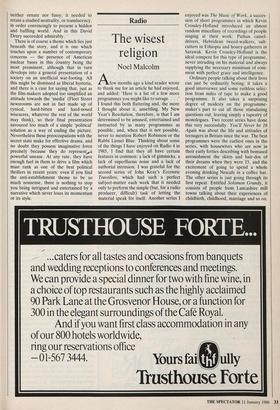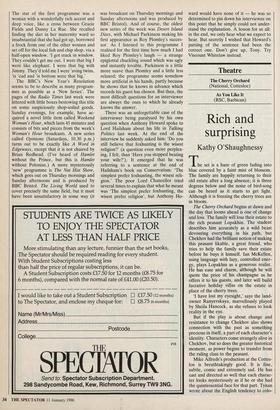Radio
The wisest religion
Noel Malcolm
Afew months ago a kind reader wrote to thank me for an article he had enjoyed, and added: 'Here is a list of a few more programmes you might like to savage. . . .' I found this both flattering and, the more I thought about it, unsettling. My New Year's Resolution, therefore, is that I am determined to be amused, entertained and instructed by as many programmes as possible, and, when that is not possible, never to mention Robert Robinson or the Rabbi Lionel Blue. Thinking about some of the things I have enjoyed on Radio 4 in 1985, I find that they all have certain features in common: a lack of gimmicks, a lack of superfluous noise and a lack of authorial intrusion. I was grateful for the second series of John Keay's Eccentric Travellers, which had such a perfect subject-matter each week that it needed only to perform the simple (but, for a radio producer, difficult) task of letting the material speak for itself. Another series I enjoyed was The Music of Work, a succes- sion of short programmes in which Kevin Crossley-Holland introduced an almost random miscellany of recordings of people singing at their work: Pathan camel- drivers, Hebridean tweed-walkers, salt- cutters in Ethiopia and honey-gatherers in Sarawak. Kevin Crossley-Holland is the ideal compere for this type of programme, never intruding on his material and always supplying the necessary minimum of com- ment with perfect grace and intelligence.
Ordinary people talking about their lives can just be ordinarily boring: it takes a good interviewer and some ruthless selec- tion from miles of tape to make a good programme. It also takes a surprising degree of modesty on the programme- maker's part to cut all those stimulating questions out, leaving simply a tapestry of monologues. Two recent series have done this very successfully. You'll Never be 16 Again was about the life and attitudes of teenagers in Britain since the war. The best programmes were the earliest ones in the series, with housewives who are now in their early forties describing with bemused astonishment the skirts and hair-dos of their dreams when they were 15, and the excitement of going to spend a whole evening drinking Nescafe in a coffee bar. The other series is just going through its first repeat. Entitled Solomon Grundy, it consists of people from Lancashire mill towns talking about their experiences of childbirth, childhood, marriage and so on.
The star of the first programme was a woman with a wonderfully rich accent and deep voice, like a cross between Gracie Fields and Danny La Rue. She recalled finding the diet in her maternity ward so insubstantial that she had got up, borrowed a frock from one of the other women and set off for the local fish and chip shop, via a half-open window. 'I got stuck in window. They couldn't get me out. I were that big I were like elephant. I were that big with Jimmy. They'd told me I were 'aving twins, 'is 'ead and 'is bottom were that big.'
The BBC's New Year's Resolution seems to be to describe as many program- mes as possible as a 'New Series'. The pages of the Radio Times last week were littered with little boxes bestowing this title on some suspiciously shop-soiled goods. Sunday evenings, for example, have ac- quired a novel little item called Weekend Woman's Hour, which lasts 45 minutes and consists of bits and pieces from the week's Woman's Hour broadcasts. A new series called Opinions (Saturdays, 10.30 p.m.) turns out to be exactly like A Word in Edgeways, except that it is not chaired by Brian Redhead. (I've heard of Hamlet without the Prince, but this is Hamlet without Polonius.) A more mysteriously `new' programme is The Nat Hist Show, which goes out on Thursday mornings and Sunday afternoons and is produced by BBC Bristol. The Living World used to cover precisely the same field, but it must have been unsatisfactory in some way (it was broadcast on Thursday mornings and Sunday afternoons and was produced by BBC Bristol). And of course, the oldest new series of the week was Desert Island Discs, with Michael Parkinson making his first appearance as Roy Plomley's succes- sor. As I listened to this programme I realised for the first time how much I had liked Roy Plomley's laugh — a strange epiglottal chuckling sound which was ugly and instantly lovable. Parkinson is a little more suave than Plomley and a little less relaxed; the programme seems somehow more artificial in his hands, partly because he shows that he knows in advance which records his guest has chosen. But then, the most difficult questions for an interviewer are always the ones to which he already knows the answer.
There was an unforgettable case of the interviewer being paralysed by his own question when Anthony Howard spoke to Lord Hailsham about his life in Talking Politics last week. At the end of the interview he suddenly asked him: 'Do you still believe that foxhunting is the wisest religion?' (a question even more perplex- ing, I felt, than 'Have you stopped beating your wife?'). It emerged that he was referring to a sentence at the end of Hailsham's book on Conservatism: 'The simplest prefer foxhunting, the wisest reli- gion.' The poor Lord Chancellor tried several times to explain that what he meant was 'The simplest prefer foxhunting, the wisest prefer religion', but Anthony Ho-
ward would have none of it — he was so determined to pin down his interviewee on this point that he simply could not under- stand the explanation. A lesson for us all: in the end, we only hear what we expect to hear. But secretly I wished that Howard's parsing of the sentence had been the correct one. Don't give up, Tony. Try Viscount Whitelaw instead.



























































 Previous page
Previous page